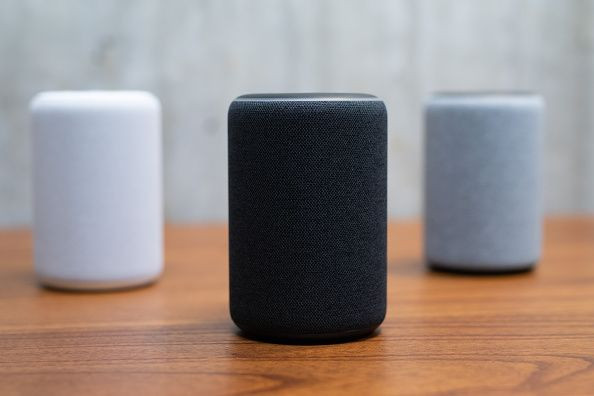Amazon Plans To Use Digital Media To Expand Its Advertising Business

Amazon's (NASDAQ:AMZN) advertising business jumped from a small footnote in its earnings report to a $10 billion business in almost no time flat. Amazon grew this segment quickly by picking most of the low-hanging fruit: banner ads and sponsored listing on its product search results pages.
In building out its ad business, Amazon launched several small ventures, hoping some would bear fruit for the company. It bought Twitch about five years ago and it recently refocused the streaming site on advertising. It launched IMDb Freedive (an ad-supported video-streaming service) at the start of the year, and it's already looking into expanding into more ad-supported video.
And this week, Billboard reports, the company is considering launching an ad-supported music-streaming service. Amazon hasn't confirmed such a service is coming or that it will expand its ad-supported video efforts.
Amazon's digital media efforts have been relatively successful so far. Prime Video and Amazon Music Unlimited have attracted sizable audiences and a steady revenue stream on the strength of the company's hardware like the Fire TV and Echo smart speakers. Using what it learned from those premium services and its advertising business could help Amazon compete against companies like Roku (NASDAQ:ROKU), Spotify (NYSE:SPOT), and Alphabet's (NASDAQ:GOOG) (NASDAQ:GOOGL) YouTube in the ad-supported digital media space.
A different approach to ad-supported streaming
In outlining how the new ad-supported music streaming service would work, Billboard reports that Amazon would pay record labels per stream, regardless of how many ads it sells. That's in contrast to Spotify's agreements with the record labels, which offer a share of revenue, as well as a guarantee of at least a certain minimum payment. YouTube also offers a revenue share for music video streams.
Amazon might take a similar approach with streaming video, where it pays up front to license content, but then it's able to keep 100 percent of ad revenue generated against that content. Roku does some of that in its Roku Channel, but it also operates a revenue-sharing model for some content.
Amazon is in a position to offer up-front payments for content thanks to its massive retail and cloud computing businesses, which generate billions in free cash flow every quarter. Spotify and Roku don't have that luxury. It also means Amazon is risking more, hoping that its ad sales will be able to cover the expenses of its operations.
It's a small risk relative to the size of Amazon's other operations. But the opportunity is massive. Roku's management says ad-supported streaming video is growing faster than premium video. Amazon stands to differentiate itself as other companies launch subscription services later this year. Meanwhile, Spotify has 116 million ad-supported listeners on its platform, and that number is still growing 24 percent year over year.
Amazon already has built-in user bases for its potential ad-supported services with around 30 million Fire TV users and millions of Echo owners. Roku, by comparison, has 27 million active accounts, and Spotify doesn't own its own platform.
Amazon's advantages in advertising
Not only does Amazon have the benefit of being able to license content up front to build its digital media services, it holds a couple big advantages in advertising that may enable it to monetize time spent in those services better than Spotify or Roku.
First and foremost, Amazon has access to some of the most valuable user data in the world. Some might argue it's better than Google's data. It knows exactly what consumers are searching for and what they're spending their money on. Both Roku and Spotify have taken steps to improve their ad-targeting capabilities in recent years, but they'll never be able to compete with Amazon.
Amazon is also capable of tracking most consumers from their first ad impression all the way through to purchasing an item. That gives ad buyers a clearer picture of how effective their ad dollars are.
Finally, Amazon has a sizable active advertiser base already. It revamped its ad-buying platform to make it easier to buy ads, including video-streaming ads for Twitch or its live sports streams for Prime members. If an active advertiser on Amazon wants to try video or audio ads with Amazon, it doesn't have to relearn a whole new ad-buying platform.
Putting it all together
Amazon has all of the ingredients to grow its advertising business on the back of new digital media services. It has an existing user base on Fire TV and Echo, the cash to spend on content to seed the services and make them attractive, and an existing advertiser base to offer the ad inventory to. That makes it a considerable threat to Roku and Spotify if Amazon decides to pursue the opportunity.
Those advantages put Amazon's potential ad-supported media business on par with Alphabet's. YouTube has already built a business around streaming music videos with little pressure on consumers to subscribe to a premium service (although it offers one). That's because YouTube is able to rely on its ability to monetize song streams better than the competition as well as its scale and infrastructure to cut down on overhead. YouTube pays more per stream than Spotify's free tier or any other ad-supported music streaming service.
Amazon benefits from the same advantages as YouTube, which could make a stand-alone ad-supported service profitable in the long run. Even if Amazon's effort fails, the downside is relatively small compared to the potential upside.
This article originally appeared in The Motley Fool.
John Mackey, CEO of Whole Foods Market, an Amazon subsidiary, is a member of The Motley Fool's board of directors. Suzanne Frey, an executive at Alphabet, is a member of The Motley Fool's board of directors. Adam Levy owns shares of Alphabet (C shares) and Amazon. The Motley Fool owns shares of and recommends Alphabet (A shares), Alphabet (C shares), and Amazon. The Motley Fool recommends Roku. The Motley Fool has a disclosure policy.





















